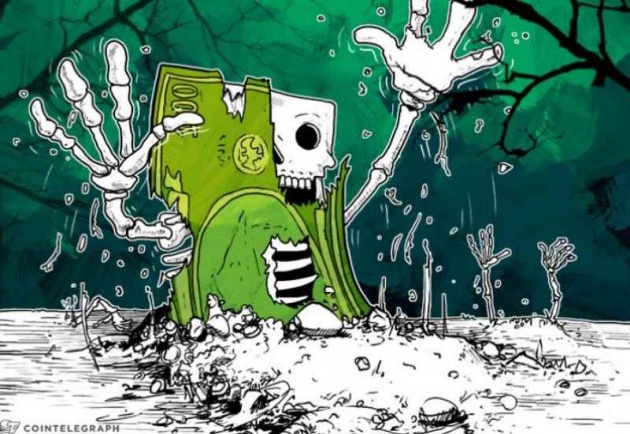
And so the war on cash begins with its first casualties: Swiss pension funds and large depositors at banks worldwide are beginning to feel the impact of negative interest rates, which have the potential to unravel the global economy.
First casualties
Swiss pension funds are under attack by the very central bank that should be protecting the prosperity of its people, the Swiss National Bank (SNB). The SNB has cut rates so low that from a nominal level they have breached the zero lower band, resulting in an essentially negative rate. This has caused Swiss pension funds to begin to withdraw cash from the bank and store it in a vault since now the cost of carry is greater than cold hard storage of cash.
With negative interest rates, Swiss pension funds now have the honor of paying the bank to hold their cash for them. One Pension fund manager calculated he would save CHF 25,000 per year on every CHF 10 million by withdrawing it from a bank and putting it into vault storage. Yes you read that right!
Negative interest rates are simply a tool to get banks to loan out money and help stimulate the economy. Pushing interest rates below the level of inflation by central banks should theoretically stimulate growth as borrowing becomes cheaper but it has also had the reverse effect of making risk-averse individuals and investors go far out on the spectrum in search for yields. The Financial Times describes this new phenomenon:
“Welcome to the Alice in Wonderland world of negative interest rates, a topsy-turvy universe where central bankers are so alarmed at the prospect of weak inflation that they have cut borrowing costs below zero, in effect charging financial institutions to leave their accounts in the black.”

Not Just a Swiss Thing
Pension funds in Switzerland are not the only ones to be feeling the affects of negative interest rates. JP Morgan has told large depositors that they would be charging a “balance sheet utilization fee” of 1% a year on deposits in excess of the money they need for operations. The goal is to get rid of US$100 billion in deposits and the targeted customers are other financial institutions.
In essence, this becomes a negative interest rate on these deposits. In other words, it is more expensive for banks to pay interest to depositors than hold their money due to extremely low interest rates and the cost and laws behind new regulations.
“Because large, uninsured deposits would be expected to leave most quickly, the rules will now require that banks maintain reserves for those deposits that they cannot use for profitable activities like making loans,” writes Emily Glazer of the WSJ. “That makes it much less efficient or profitable for banks to hold these deposits.”
JP Morgan is not the only bank that has this problem others include: Citigroup, HSBC, Deutsche Bank, and Bank of America. In other words, welcome to the world of forced vault storage of cash.
War on Cash
Lower commodity prices, stagnant wage growth, low returns on savings and low GDP growth in developed economies are all signs of the one word that scares central banks – deflation.
Central bankers believe negative interest rates can fix this, and many think they should go even lower to help stimulate economic growth. Physical paper money is a big problem in this sense because it is an alternative for customers who want to withdraw their deposits (like pension funds and store in a vault).
“Physical paper money provides the check against negative interest rates for if they become too great, people will simply withdraw their funds and hoard cash,” says economist Martin Armstrong. “Furthermore, paper currency allows for bank runs. Eliminate paper currency and what you end up with is the elimination of the ability to demand to withdraw funds from a bank.”
Electronic currency also transfers complete control of the money supply to the central banks to implement whatever policies they desire. Armstrong further explains why central banks dislike physical cash:
“Paper currency is indeed the check against negative interest rates. We need only look to Switzerland to prove that theory. Any attempt to impose say a 5% negative interest rates (tax) would lead to an unimaginably massive flight into cash. This was already demonstrated recently by the example of Swiss pension funds, which withdrew their money from the bank in a big way and now store it in vaults in cash in order to escape the financial repression. People will act in their own self-interest and negative interest rates are likely to reduce the sales of government bonds and set off a bank run as long as paper money exists.”

Cold, Hard Cash as a Store of Value not a Medium of Exchange
New federal rules penalize banks for holding deposits that are prone to flee during a crisis or stressed environment. This essentially is any depositor (including other banks) who is over the FDIC insurance limit of US$250,000, making this policy a potent weapon in the war on cash.
Therefore, most large depositors don’t hold their money in a savings account but in highly rated bonds as a preferred store of wealth. These bonds have super low yields, which essentially come out to be the cost of storage to hold them at large institutions. This, in turn, takes large amounts of cash out of circulation and not used as a medium of exchange, but a store of value.
As has been noted in previous articles, this has decreased the supply of bonds, particularly safe bonds, in the market. Highly rated corporate bond inventories have dropped dramatically in the US and Europe (75% and 50% respectively) and demand for these bonds has risen. This has driven the price and the yields to drop dramatically to a point where they are negative once the cost of the newly implemented deposit fees is taken into account.
Stricter regulations have also caused banks to keep more bonds on their balance sheets. In other words, cash is going extinct, unless you pay to protect it.
The Liquidity Paradox
Liquidity paradox is a term coined by Citibank analyst Matt King to explain Central Bank policies of QE and extreme easing, which has herded investors into risky assets to get returns at a better rate than near 0%.
According to Citi, this has caused “large scale mismatches in the number of buyers and sellers.” This has resulted in investors all investing in the same manner in the search for returns giving rise to the liquidity paradox:
“[…] because the more liquidity central banks add, the higher the risk of a serious liquidity crunch - started out in corporate bond markets but is now distorting government bond, currency and share markets. It says while the post-financial crisis crackdown on own-account trading by investment houses was partly to blame for a decline in professional market-making, the increased difficulty of finding buyers because everyone is selling at once owes more to central banks' hold on financial markets since the crisis.”
A New Era for Banking
These policies have led to distortions in the capital markets and most people investing in the same way (herd-like investing) exacerbating the liquidity problem. Unwinding these trades is going to be problematic due to the massive one-sided trading.
Welcome to the new era of banking where banks will only accept money if customers are willing to pay for this “privilege”. Access to capital markets is being eroded and paper money is being faded out. When will enough be enough? Who would ever have thought that banks would shun cash and that the old-school vault and storage businesses would be a part of this “new economy.”
Cold, Hard Cash as a Store of Value not a Medium of Exchange
New federal rules penalize banks for holding deposits that are prone to flee during a crisis or stressed environment. This essentially is any depositor (including other banks) who is over the FDIC insurance limit of US$250,000, making this policy a potent weapon in the war on cash.
Therefore, most large depositors don’t hold their money in a savings account but in highly rated bonds as a preferred store of wealth. These bonds have super low yields, which essentially come out to be the cost of storage to hold them at large institutions. This, in turn, takes large amounts of cash out of circulation and not used as a medium of exchange, but a store of value.
As has been noted in previous articles, this has decreased the supply of bonds, particularly safe bonds, in the market. Highly rated corporate bond inventories have dropped dramatically in the US and Europe (75% and 50% respectively) and demand for these bonds has risen. This has driven the price and the yields to drop dramatically to a point where they are negative once the cost of the newly implemented deposit fees is taken into account.
Stricter regulations have also caused banks to keep more bonds on their balance sheets. In other words, cash is going extinct, unless you pay to protect it.
The Liquidity Paradox
Liquidity paradox is a term coined by Citibank analyst Matt King to explain Central Bank policies of QE and extreme easing, which has herded investors into risky assets to get returns at a better rate than near 0%.
According to Citi, this has caused “large scale mismatches in the number of buyers and sellers.” This has resulted in investors all investing in the same manner in the search for returns giving rise to the liquidity paradox:
“[…] because the more liquidity central banks add, the higher the risk of a serious liquidity crunch - started out in corporate bond markets but is now distorting government bond, currency and share markets. It says while the post-financial crisis crackdown on own-account trading by investment houses was partly to blame for a decline in professional market-making, the increased difficulty of finding buyers because everyone is selling at once owes more to central banks' hold on financial markets since the crisis.”
A New Era for Banking
These policies have led to distortions in the capital markets and most people investing in the same way (herd-like investing) exacerbating the liquidity problem. Unwinding these trades is going to be problematic due to the massive one-sided trading.
Welcome to the new era of banking where banks will only accept money if customers are willing to pay for this “privilege”. Access to capital markets is being eroded and paper money is being faded out. When will enough be enough? Who would ever have thought that banks would shun cash and that the old-school vault and storage businesses would be a part of this “new economy.”
- See more at: btc.diet/news/cash-is-going-extinct-unless-you-pay-to-protect-it#sthash.0ff5nxPL.dpuf


